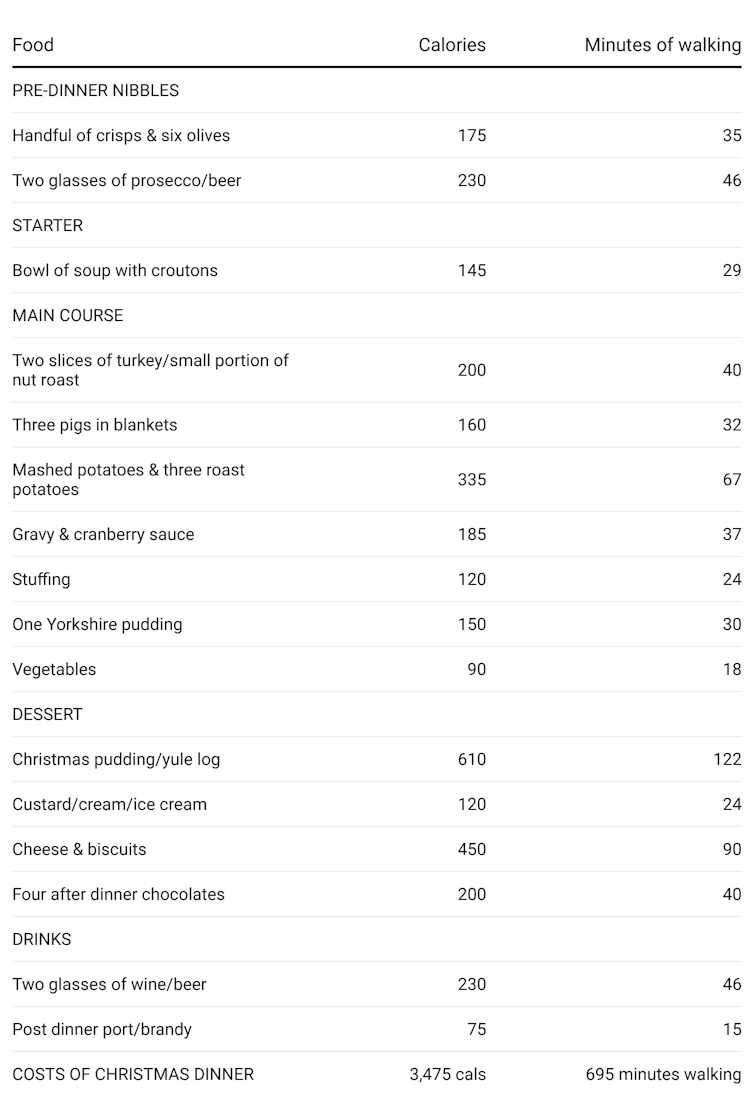Overeating at Christmas time is almost like a tradition. Many of us look forward to piling our plates full of festive foods, snacking on chocolate throughout the holidays or sipping on festive drinks. Even if you were trying to eat healthier, indulgent foods are often displayed more prominently in supermarkets and shops during the holidays, making it difficult to pass up on our favourite foods and drinks.
The British Dietetic Association estimates that on Christmas day alone people might consume around 6,000 calories – with Christmas dinner responsible for most of these. But spending time with friends, work Christmas parties and New Year’s celebrations might all see us overeat in the days and even weeks before and after Christmas. It’s no wonder the average adult gains around 0.5-1kg over the Christmas holidays.
While that might not sound like a lot, the weight we gain during the festive season isn’t always lost in the new year. This excess weight gain over the years could see some people become overweight or obese, which may increase their risk of many conditions, including cancer, diabetes, hypertension or stroke.
But research shows that giving people information about how many minutes of walking (or running) it will take to burn off the calories from foods or drinks can help people eat less and avoid gaining weight at Christmas. So, how much walking do you need to do in order to burn off Christmas dinner?

For an adult weighing 84kg it will take about 12 hours of steady paced walking (around four miles an hour) to burn off the calories of an average Christmas dinner. This is the equivalent of walking approximately 50 miles. Or, if you prefer, you could jog for about five to six hours.
Of course, the number of calories in your dinner will also depend on what foods you eat, how you prepare them and whether you go back for seconds. For example, if you cut out the pre-dinner nibbles and appetisers, and only have a yule log for dessert alongside two glasses of wine, your Christmas dinner may only come in around 2,080 calories. For someone weighing 84kg, this would only take around six and a half hours of walking to burn off.
The amount of physical activity you’ll need to do to burn off your dinner will also depend on many factors such as age, gender and weight.
Holiday weight gain does not have to be inevitable – and walking is a great activity you can do by yourself or with others. While walking for 12 hours straight isn’t something anyone wants to do during the holidays, there are many easy ways you can sneak more physical activity in during the holidays each day. For example, try walking to the shops instead of using your car if you can, or take a cycle around your neighbourhood with your children to look at the Christmas lights.
Of course, it’s hard not to indulge over Christmas since it only comes around once a year. Some other easy ways to eat fewer calories during the holidays include snacking wisely, and being cautious with your portions. If you find that you have gained weight after Christmas don’t be disheartened and try to focus on reducing the treats, and setting yourself a goal to get your weight back on track as soon as you can in the new year.![]()
Amanda Daley, Professor of Behavioural Medicine, Loughborough University
This article is republished from The Conversation under a Creative Commons license. Read the original article.
If anyone would like any guidance or support regarding eating disorders, the charity Beat has helpline services available 365 days a year. For more information on the services visit: https://www.beateatingdisorders.org.uk/support-services
